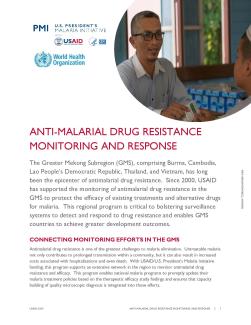The Greater Mekong Subregion (GMS), comprising Burma, Cambodia, Lao People’s Democratic Republic, Thailand, and Vietnam, has long been the epicenter of antimalarial drug resistance. Since 2000, USAID has supported the monitoring of antimalarial drug resistance in the GMS to protect the efficacy of existing treatments and alternative drugs for malaria. This regional program is critical to bolstering surveillance systems to detect and respond to drug resistance and enables GMS countries to achieve greater development outcomes.
CONNECTING MONITORING EFFORTS IN THE GMS
Antimalarial drug resistance is one of the greatest challenges to malaria elimination. Untreatable malaria not only contributes to prolonged transmission within a community, but it can also result in increased costs associated with hospitalizations and even death. With USAID/U.S. President’s Malaria Initiative funding, this program supports an extensive network in the region to monitor antimalarial drug resistance and efficacy. This program enables national malaria programs to promptly update their malaria treatment policies based on the therapeutic efficacy study findings and ensures that capacity building of quality microscopic diagnosis is integrated into those efforts.
REGIONAL INFORMATION SHARING
This program supports regional workshops for countries to share data on antimalarial drug resistance and provide technical assistance on the updating of treatment policies. USAID supports the WHO standardization of protocols and results to inform decision-making across the region. Currently, there is a regional strategic shift to detect, treat, and follow-up all malaria patients to ensure that patients complete the full course of treatment and fully recover. USAID is supporting the piloting and scaling up of this innovative approach (known as integrated drug efficacy surveillance) through the routine malaria surveillance system to inform country treatment policies and regional strategies to ensure the availability of, and access to, efficacious antimalarial drugs.
IMPACTS AND RESULTS
The coordination and successful implementation of therapeutic efficacy studies to monitor antimalarial drug resistance surveillance in the GMS has resulted in updated treatment policies in Burma, Cambodia, Thailand, Lao PDR, and Vietnam.
The program piloted the integrated drug efficacy surveillance system to monitor treatment success in Thailand, which serves as a model for the region and other countries in the world. This model of excellence informs global guidance on conducting drug efficacy monitoring in the context of malaria elimination.
This program also contributes to WHO’s Global Malaria Program to publish regular status updates on artemisinin resistance. This regular monitoring of medications in Asia and Africa shows that ACTs remain effective in Africa and other parts of the world.


